Detailed Analysis of Project Time and Cost Management Methodologies
VerifiedAdded on 2020/05/01
|7
|1406
|347
Report
AI Summary
This report delves into the critical aspects of time and cost management within project management, emphasizing their significance for project success. It highlights the value of sound time and cost management plans, detailing how they facilitate adherence to project scope, budget, and timelines while mitigating risks and stress. The report explores various time management tools and techniques, including time blocking, weekly reviews, and to-do lists, along with cost management methods such as expert judgment, bottom-up estimation, and reserve analysis. Furthermore, it outlines activities for managing project scope, such as planning, controlling, and auditing deliverables. The report concludes by underscoring the importance of these practices and techniques in ensuring projects are completed successfully, within budget, and to the desired quality.

Project management methodologies
Institutional Affiliation
Name
Date
Institutional Affiliation
Name
Date
Paraphrase This Document
Need a fresh take? Get an instant paraphrase of this document with our AI Paraphraser
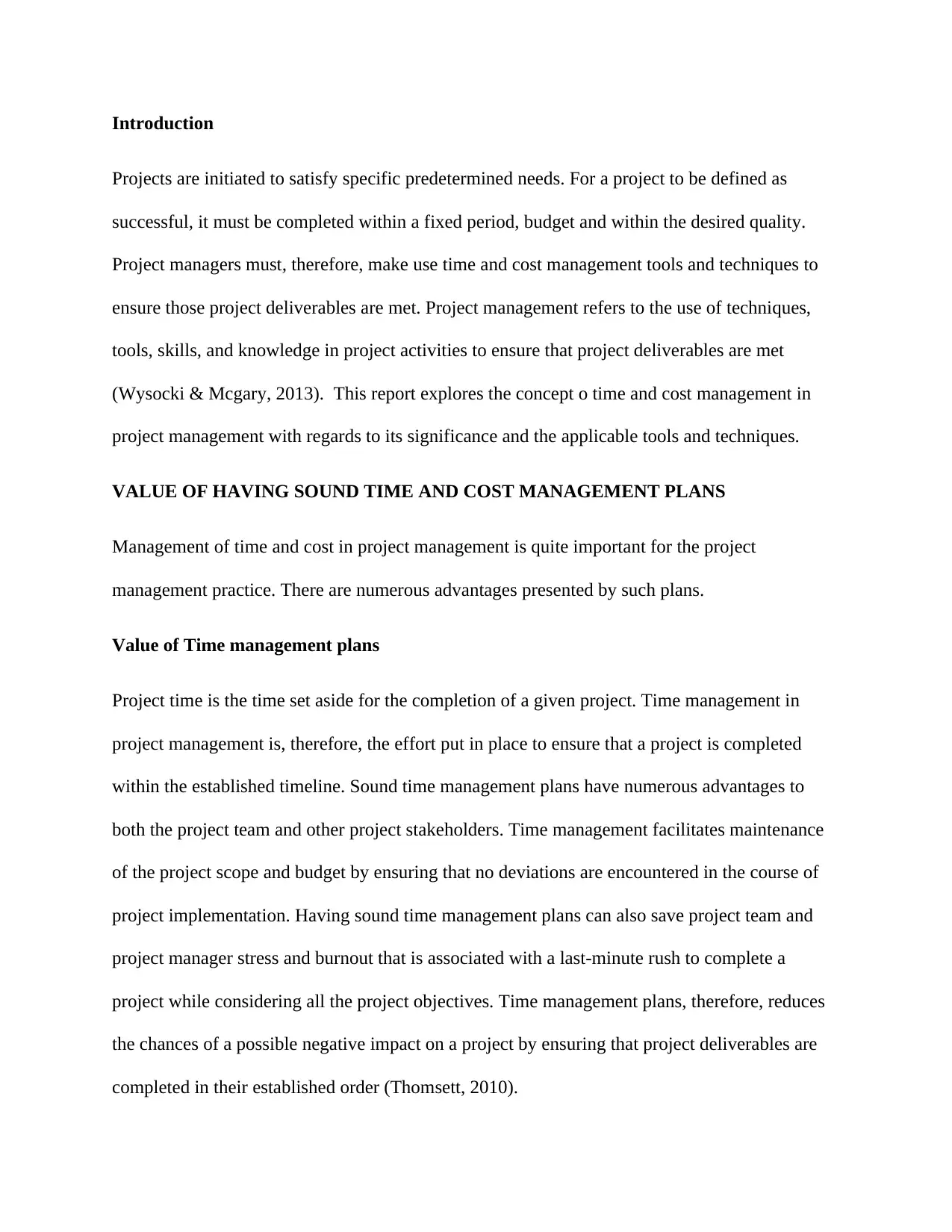
Introduction
Projects are initiated to satisfy specific predetermined needs. For a project to be defined as
successful, it must be completed within a fixed period, budget and within the desired quality.
Project managers must, therefore, make use time and cost management tools and techniques to
ensure those project deliverables are met. Project management refers to the use of techniques,
tools, skills, and knowledge in project activities to ensure that project deliverables are met
(Wysocki & Mcgary, 2013). This report explores the concept o time and cost management in
project management with regards to its significance and the applicable tools and techniques.
VALUE OF HAVING SOUND TIME AND COST MANAGEMENT PLANS
Management of time and cost in project management is quite important for the project
management practice. There are numerous advantages presented by such plans.
Value of Time management plans
Project time is the time set aside for the completion of a given project. Time management in
project management is, therefore, the effort put in place to ensure that a project is completed
within the established timeline. Sound time management plans have numerous advantages to
both the project team and other project stakeholders. Time management facilitates maintenance
of the project scope and budget by ensuring that no deviations are encountered in the course of
project implementation. Having sound time management plans can also save project team and
project manager stress and burnout that is associated with a last-minute rush to complete a
project while considering all the project objectives. Time management plans, therefore, reduces
the chances of a possible negative impact on a project by ensuring that project deliverables are
completed in their established order (Thomsett, 2010).
Projects are initiated to satisfy specific predetermined needs. For a project to be defined as
successful, it must be completed within a fixed period, budget and within the desired quality.
Project managers must, therefore, make use time and cost management tools and techniques to
ensure those project deliverables are met. Project management refers to the use of techniques,
tools, skills, and knowledge in project activities to ensure that project deliverables are met
(Wysocki & Mcgary, 2013). This report explores the concept o time and cost management in
project management with regards to its significance and the applicable tools and techniques.
VALUE OF HAVING SOUND TIME AND COST MANAGEMENT PLANS
Management of time and cost in project management is quite important for the project
management practice. There are numerous advantages presented by such plans.
Value of Time management plans
Project time is the time set aside for the completion of a given project. Time management in
project management is, therefore, the effort put in place to ensure that a project is completed
within the established timeline. Sound time management plans have numerous advantages to
both the project team and other project stakeholders. Time management facilitates maintenance
of the project scope and budget by ensuring that no deviations are encountered in the course of
project implementation. Having sound time management plans can also save project team and
project manager stress and burnout that is associated with a last-minute rush to complete a
project while considering all the project objectives. Time management plans, therefore, reduces
the chances of a possible negative impact on a project by ensuring that project deliverables are
completed in their established order (Thomsett, 2010).
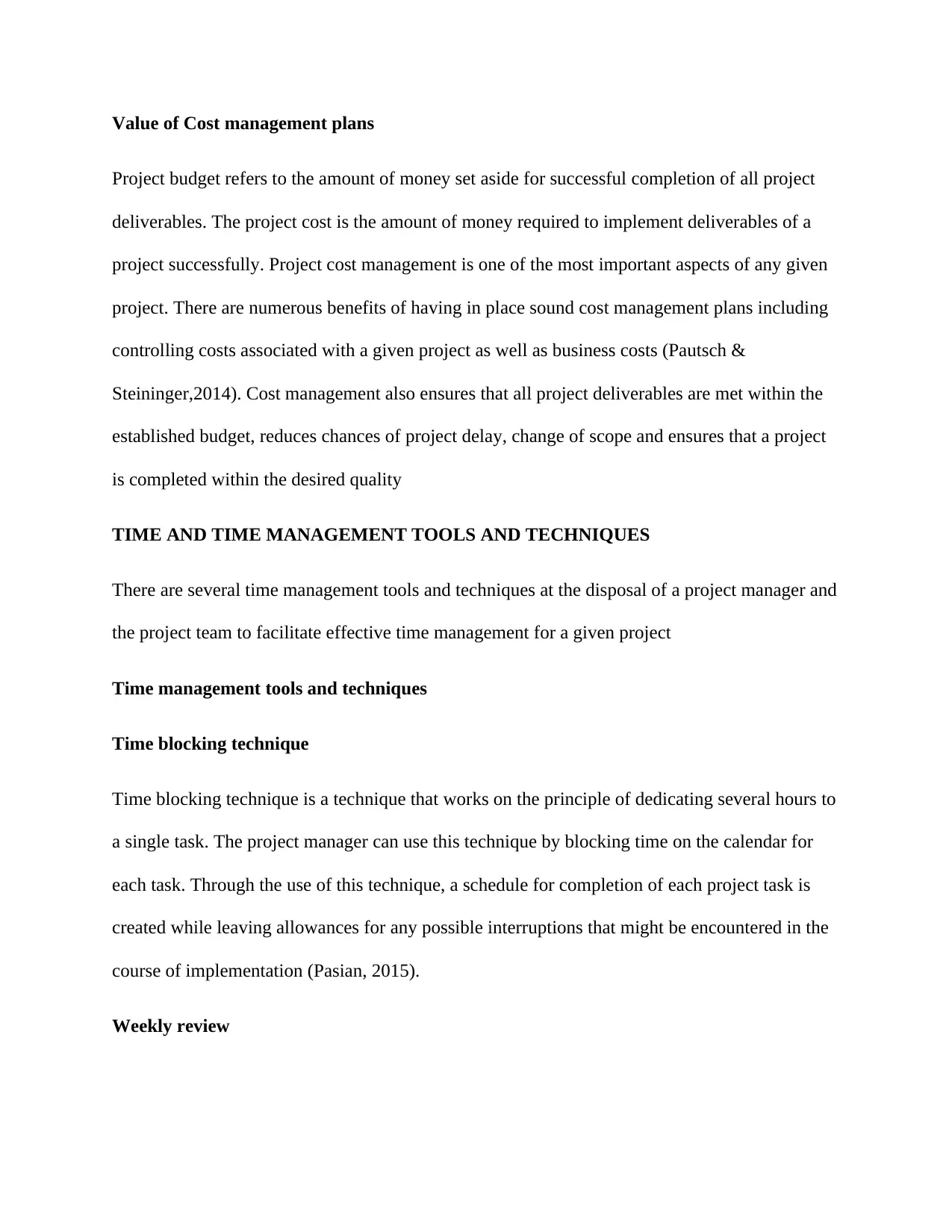
Value of Cost management plans
Project budget refers to the amount of money set aside for successful completion of all project
deliverables. The project cost is the amount of money required to implement deliverables of a
project successfully. Project cost management is one of the most important aspects of any given
project. There are numerous benefits of having in place sound cost management plans including
controlling costs associated with a given project as well as business costs (Pautsch &
Steininger,2014). Cost management also ensures that all project deliverables are met within the
established budget, reduces chances of project delay, change of scope and ensures that a project
is completed within the desired quality
TIME AND TIME MANAGEMENT TOOLS AND TECHNIQUES
There are several time management tools and techniques at the disposal of a project manager and
the project team to facilitate effective time management for a given project
Time management tools and techniques
Time blocking technique
Time blocking technique is a technique that works on the principle of dedicating several hours to
a single task. The project manager can use this technique by blocking time on the calendar for
each task. Through the use of this technique, a schedule for completion of each project task is
created while leaving allowances for any possible interruptions that might be encountered in the
course of implementation (Pasian, 2015).
Weekly review
Project budget refers to the amount of money set aside for successful completion of all project
deliverables. The project cost is the amount of money required to implement deliverables of a
project successfully. Project cost management is one of the most important aspects of any given
project. There are numerous benefits of having in place sound cost management plans including
controlling costs associated with a given project as well as business costs (Pautsch &
Steininger,2014). Cost management also ensures that all project deliverables are met within the
established budget, reduces chances of project delay, change of scope and ensures that a project
is completed within the desired quality
TIME AND TIME MANAGEMENT TOOLS AND TECHNIQUES
There are several time management tools and techniques at the disposal of a project manager and
the project team to facilitate effective time management for a given project
Time management tools and techniques
Time blocking technique
Time blocking technique is a technique that works on the principle of dedicating several hours to
a single task. The project manager can use this technique by blocking time on the calendar for
each task. Through the use of this technique, a schedule for completion of each project task is
created while leaving allowances for any possible interruptions that might be encountered in the
course of implementation (Pasian, 2015).
Weekly review
⊘ This is a preview!⊘
Do you want full access?
Subscribe today to unlock all pages.

Trusted by 1+ million students worldwide
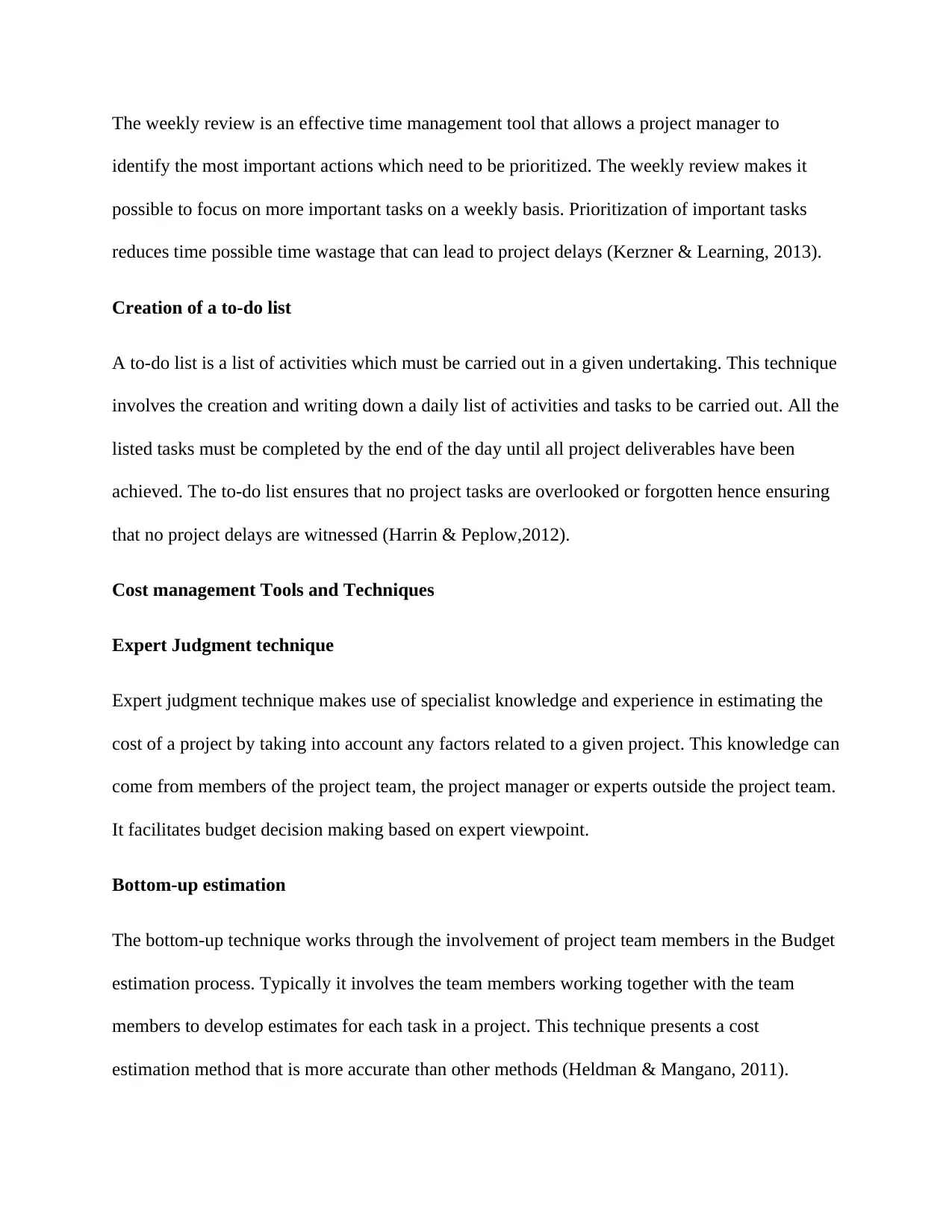
The weekly review is an effective time management tool that allows a project manager to
identify the most important actions which need to be prioritized. The weekly review makes it
possible to focus on more important tasks on a weekly basis. Prioritization of important tasks
reduces time possible time wastage that can lead to project delays (Kerzner & Learning, 2013).
Creation of a to-do list
A to-do list is a list of activities which must be carried out in a given undertaking. This technique
involves the creation and writing down a daily list of activities and tasks to be carried out. All the
listed tasks must be completed by the end of the day until all project deliverables have been
achieved. The to-do list ensures that no project tasks are overlooked or forgotten hence ensuring
that no project delays are witnessed (Harrin & Peplow,2012).
Cost management Tools and Techniques
Expert Judgment technique
Expert judgment technique makes use of specialist knowledge and experience in estimating the
cost of a project by taking into account any factors related to a given project. This knowledge can
come from members of the project team, the project manager or experts outside the project team.
It facilitates budget decision making based on expert viewpoint.
Bottom-up estimation
The bottom-up technique works through the involvement of project team members in the Budget
estimation process. Typically it involves the team members working together with the team
members to develop estimates for each task in a project. This technique presents a cost
estimation method that is more accurate than other methods (Heldman & Mangano, 2011).
identify the most important actions which need to be prioritized. The weekly review makes it
possible to focus on more important tasks on a weekly basis. Prioritization of important tasks
reduces time possible time wastage that can lead to project delays (Kerzner & Learning, 2013).
Creation of a to-do list
A to-do list is a list of activities which must be carried out in a given undertaking. This technique
involves the creation and writing down a daily list of activities and tasks to be carried out. All the
listed tasks must be completed by the end of the day until all project deliverables have been
achieved. The to-do list ensures that no project tasks are overlooked or forgotten hence ensuring
that no project delays are witnessed (Harrin & Peplow,2012).
Cost management Tools and Techniques
Expert Judgment technique
Expert judgment technique makes use of specialist knowledge and experience in estimating the
cost of a project by taking into account any factors related to a given project. This knowledge can
come from members of the project team, the project manager or experts outside the project team.
It facilitates budget decision making based on expert viewpoint.
Bottom-up estimation
The bottom-up technique works through the involvement of project team members in the Budget
estimation process. Typically it involves the team members working together with the team
members to develop estimates for each task in a project. This technique presents a cost
estimation method that is more accurate than other methods (Heldman & Mangano, 2011).
Paraphrase This Document
Need a fresh take? Get an instant paraphrase of this document with our AI Paraphraser
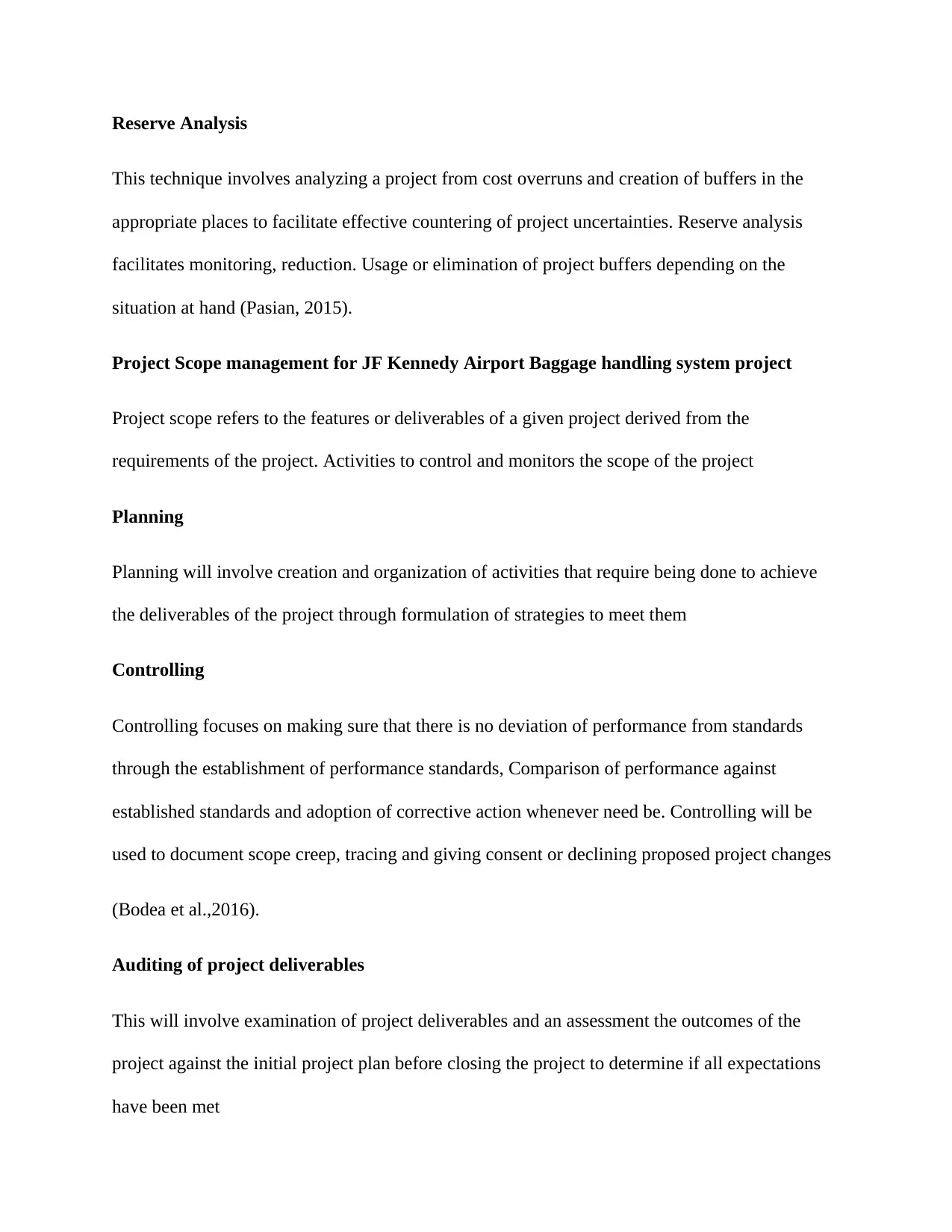
Reserve Analysis
This technique involves analyzing a project from cost overruns and creation of buffers in the
appropriate places to facilitate effective countering of project uncertainties. Reserve analysis
facilitates monitoring, reduction. Usage or elimination of project buffers depending on the
situation at hand (Pasian, 2015).
Project Scope management for JF Kennedy Airport Baggage handling system project
Project scope refers to the features or deliverables of a given project derived from the
requirements of the project. Activities to control and monitors the scope of the project
Planning
Planning will involve creation and organization of activities that require being done to achieve
the deliverables of the project through formulation of strategies to meet them
Controlling
Controlling focuses on making sure that there is no deviation of performance from standards
through the establishment of performance standards, Comparison of performance against
established standards and adoption of corrective action whenever need be. Controlling will be
used to document scope creep, tracing and giving consent or declining proposed project changes
(Bodea et al.,2016).
Auditing of project deliverables
This will involve examination of project deliverables and an assessment the outcomes of the
project against the initial project plan before closing the project to determine if all expectations
have been met
This technique involves analyzing a project from cost overruns and creation of buffers in the
appropriate places to facilitate effective countering of project uncertainties. Reserve analysis
facilitates monitoring, reduction. Usage or elimination of project buffers depending on the
situation at hand (Pasian, 2015).
Project Scope management for JF Kennedy Airport Baggage handling system project
Project scope refers to the features or deliverables of a given project derived from the
requirements of the project. Activities to control and monitors the scope of the project
Planning
Planning will involve creation and organization of activities that require being done to achieve
the deliverables of the project through formulation of strategies to meet them
Controlling
Controlling focuses on making sure that there is no deviation of performance from standards
through the establishment of performance standards, Comparison of performance against
established standards and adoption of corrective action whenever need be. Controlling will be
used to document scope creep, tracing and giving consent or declining proposed project changes
(Bodea et al.,2016).
Auditing of project deliverables
This will involve examination of project deliverables and an assessment the outcomes of the
project against the initial project plan before closing the project to determine if all expectations
have been met
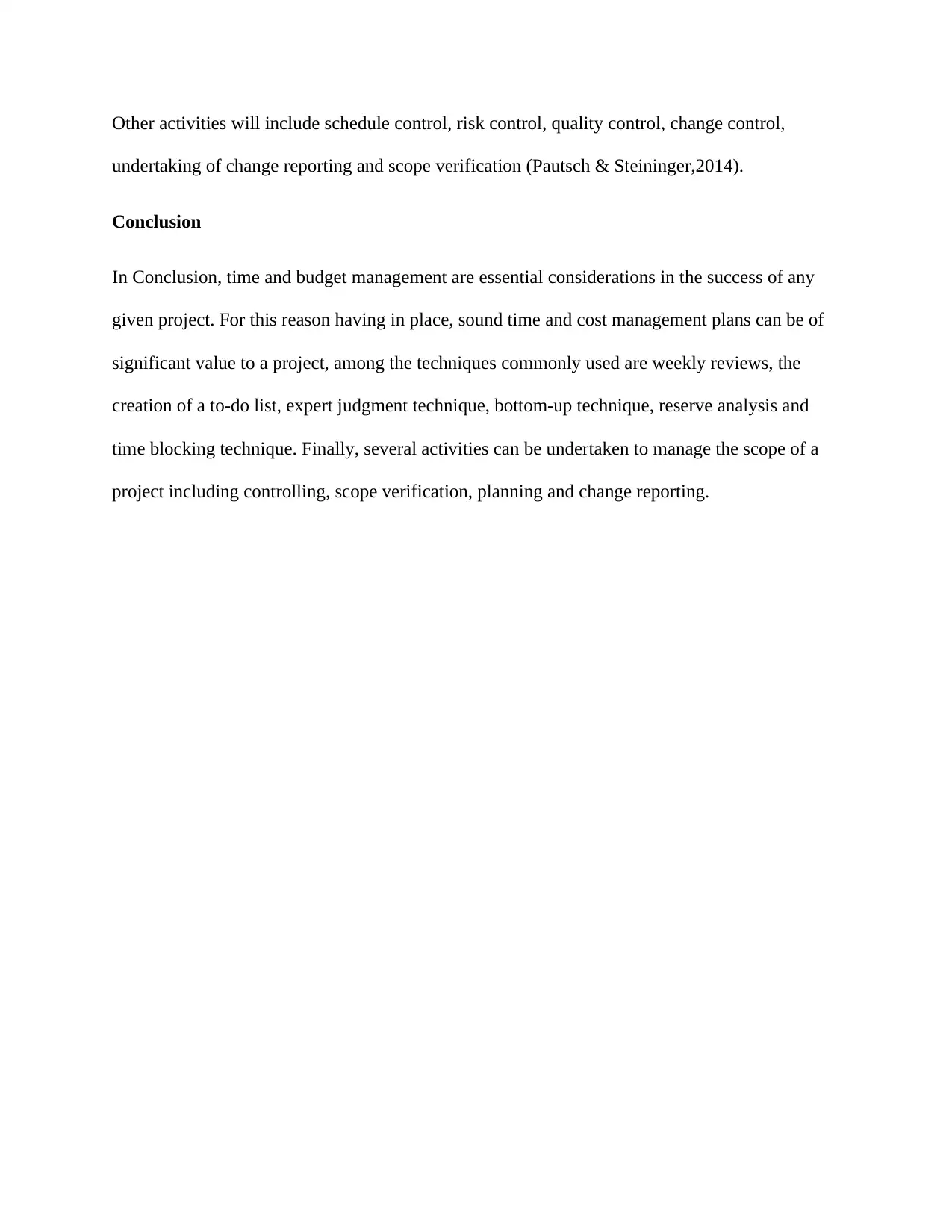
Other activities will include schedule control, risk control, quality control, change control,
undertaking of change reporting and scope verification (Pautsch & Steininger,2014).
Conclusion
In Conclusion, time and budget management are essential considerations in the success of any
given project. For this reason having in place, sound time and cost management plans can be of
significant value to a project, among the techniques commonly used are weekly reviews, the
creation of a to-do list, expert judgment technique, bottom-up technique, reserve analysis and
time blocking technique. Finally, several activities can be undertaken to manage the scope of a
project including controlling, scope verification, planning and change reporting.
undertaking of change reporting and scope verification (Pautsch & Steininger,2014).
Conclusion
In Conclusion, time and budget management are essential considerations in the success of any
given project. For this reason having in place, sound time and cost management plans can be of
significant value to a project, among the techniques commonly used are weekly reviews, the
creation of a to-do list, expert judgment technique, bottom-up technique, reserve analysis and
time blocking technique. Finally, several activities can be undertaken to manage the scope of a
project including controlling, scope verification, planning and change reporting.
⊘ This is a preview!⊘
Do you want full access?
Subscribe today to unlock all pages.

Trusted by 1+ million students worldwide
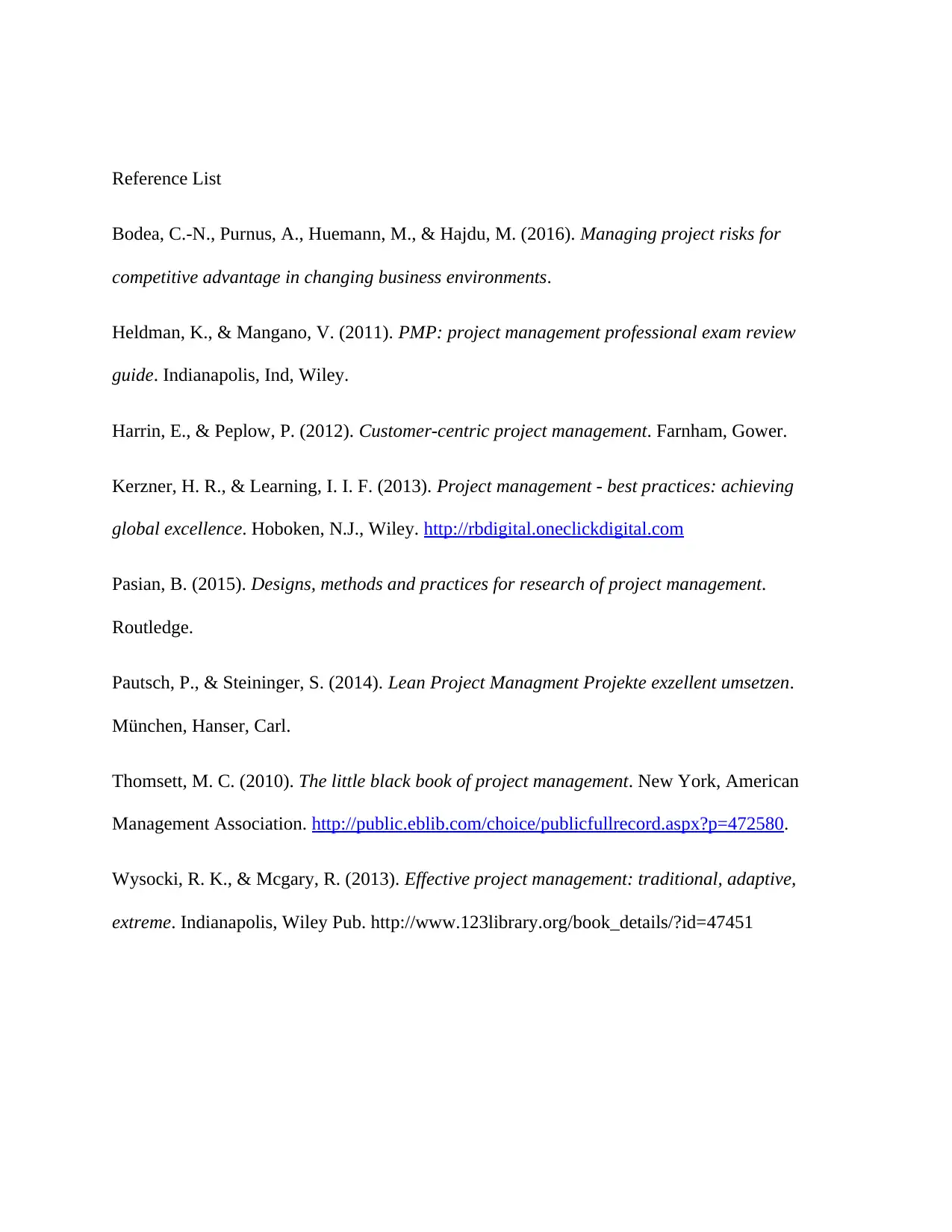
Reference List
Bodea, C.-N., Purnus, A., Huemann, M., & Hajdu, M. (2016). Managing project risks for
competitive advantage in changing business environments.
Heldman, K., & Mangano, V. (2011). PMP: project management professional exam review
guide. Indianapolis, Ind, Wiley.
Harrin, E., & Peplow, P. (2012). Customer-centric project management. Farnham, Gower.
Kerzner, H. R., & Learning, I. I. F. (2013). Project management - best practices: achieving
global excellence. Hoboken, N.J., Wiley. http://rbdigital.oneclickdigital.com
Pasian, B. (2015). Designs, methods and practices for research of project management.
Routledge.
Pautsch, P., & Steininger, S. (2014). Lean Project Managment Projekte exzellent umsetzen.
München, Hanser, Carl.
Thomsett, M. C. (2010). The little black book of project management. New York, American
Management Association. http://public.eblib.com/choice/publicfullrecord.aspx?p=472580.
Wysocki, R. K., & Mcgary, R. (2013). Effective project management: traditional, adaptive,
extreme. Indianapolis, Wiley Pub. http://www.123library.org/book_details/?id=47451
Bodea, C.-N., Purnus, A., Huemann, M., & Hajdu, M. (2016). Managing project risks for
competitive advantage in changing business environments.
Heldman, K., & Mangano, V. (2011). PMP: project management professional exam review
guide. Indianapolis, Ind, Wiley.
Harrin, E., & Peplow, P. (2012). Customer-centric project management. Farnham, Gower.
Kerzner, H. R., & Learning, I. I. F. (2013). Project management - best practices: achieving
global excellence. Hoboken, N.J., Wiley. http://rbdigital.oneclickdigital.com
Pasian, B. (2015). Designs, methods and practices for research of project management.
Routledge.
Pautsch, P., & Steininger, S. (2014). Lean Project Managment Projekte exzellent umsetzen.
München, Hanser, Carl.
Thomsett, M. C. (2010). The little black book of project management. New York, American
Management Association. http://public.eblib.com/choice/publicfullrecord.aspx?p=472580.
Wysocki, R. K., & Mcgary, R. (2013). Effective project management: traditional, adaptive,
extreme. Indianapolis, Wiley Pub. http://www.123library.org/book_details/?id=47451
1 out of 7
Related Documents
Your All-in-One AI-Powered Toolkit for Academic Success.
+13062052269
info@desklib.com
Available 24*7 on WhatsApp / Email
![[object Object]](/_next/static/media/star-bottom.7253800d.svg)
Unlock your academic potential
Copyright © 2020–2026 A2Z Services. All Rights Reserved. Developed and managed by ZUCOL.





